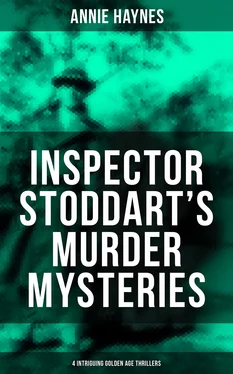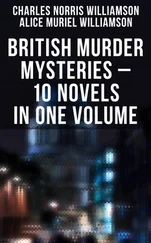"I know," Harbord assented. "It has been rather a stumbling-block, unless one of the servants put it there—or Basil Wilton himself. I must confess that my faith has wavered sometimes."
"Well, it need not," the inspector said t shortly. "The housemaid at Wilton's brother's house remembered yesterday—after swearing all along that no one had been upstairs but the inmates of the house—that a day or two after Wilton's arrival a man came to see after the gas. It appears that the Gas Company undertakes, for a small fee, to keep the burners, mantles, etc., in order. She noticed his coming because another man had been only three days before. But he explained this by saying that some special kind of burner was needed in one of the rooms."
"I suppose the man would be in a sort of uniform?" Harbord interposed.
"She said he wore the Company's cap, as she calls it. And he had a book, but she didn't look at that, and she was uncertain about the cap when pressed. But the point is: I went to the Gas and Coke Company's office, and found that no second man had been sent, and no special burner ordered or supplied. The girl left the man in the room and of course he could have put a ticket anywhere or have done what he liked. I feel no doubt that it was just to plant the ticket there that he went up."
"Why didn't the girl think of this before?" Harbord questioned.
"Says she never gave the man another thought until I was questioning her yesterday. Doesn't remember anything about him now except that he looked oldish, and is sure she wouldn't know him again. The girl's a fool!" the inspector finished.
"Well, her evidence won't be much good for the trial by itself. We must concentrate on the dark beard."
"That is like looking for a needle in a haystack," Harbord rejoined. "I have visited so many hairdressers' shops in the past few weeks, without any success, that I am beginning to think the murderer, whoever he is, made it himself."
The inspector shook his head. "No, it was too well done to be the work of an amateur. If we could find out where it was made and for whom, I firmly believe that we should have solved both the secret of Dr. Bastow's death and the Hawksview Mansions Mystery. One great difficulty is that it may not have been made in London or even in England at all. Also, it may have been done years ago, and the maker may be dead. But I heard last night of a man who does a great deal of work, in a small way, for theatrical folks. He has a little shop in a street off the Strand at the back of Drury Lane. That is where I am making for now." As he spoke, he stopped the taxi at Charing Cross. "We will get out here."
The two men threaded their way across the traffic of the Strand.
Harbord had known, ever since he came into the Hawksview Mansions Case, that Stoddart held a very strong opinion with regard to Basil Wilton's innocence. It was one that Harbord himself was not altogether inclined to share. There were times when he felt that the evidence against Wilton was too strong to be disproved, and he had not had Stoddart's experience in the Bastow Mystery. There were alternative moments when he felt that certain suspicions of Stoddart's which he had fathomed must be well-founded. The inspector was not the sort of man to take fancies without any cause.
Stoddart did not speak again as they turned up by the side of Charing Cross, along Chandos Street, and then across to Maiden Lane. From there they dived into that labyrinth of back streets that lies between Covent Garden and Drury Lane. The inspector wound his way in and out, at last coming to a standstill before a dust-begrimed little shop that surely must have been a survival of the old Seven Dials.
"This is our goal."
Harbord looked up. The name of Simon Lesson told him nothing, but the quaint, old-fashioned bow window held various examples of the hairdresser's art. The door was another survival. Divided into halves, one closed, the top one open. The inspector put his hand over and unlatched the bottom one. A curious, old bell tinkled, and an old man with a funny, wrinkled face and a hump-back got up from his seat behind the counter.
"Mr. Simon Lesson?" the inspector began politely.
"At your service, sir," the little man said with an elfish grin. "Anything I can do for you in the way of make-up will give me the greatest pleasure. I may say that some of the greatest actors of our time—of all time—have availed themselves of my poor skill and have expressed themselves satisfied."
"I am quite sure they would be," the inspector agreed. "It is just a little information I want from you this morning. But if you will glance at my card, Mr. Lesson—"
The little man took the card. The grin died off his wizened face.
"I don't know what your business may be, gentlemen, but I have always kept myself to myself. I have never been called in question by the police."
"That also I am sure of," the inspector returned. "It is your help we want, Mr. Lesson. I am told that you are the only man in London who can be of any assistance to us."
As he spoke he put a paper-bag that he had been carrying on the counter and, opening it, produced the brown beard that had been found in the bag at the station. He held it up.
"Can you tell us anything about this, Mr. Lesson? We are particularly anxious to find the maker. Not that there is any trouble threatening him—far from it. But we must find out for whom it was made."
Simon Lesson took the beard in his hand. He scrutinized it carefully, he held it up to the light, then, screwing a magnifying-glass in one eye, he bent over it, while the other two men watched him in silence.
At last he looked up.
"I had nothing to do with the making of this, gentlemen, if that is what you want to know."
An expression of keen disappointment crossed the inspector's face, but he smoothed it out directly.
"It is a wonderfully good thing, Mr. Lesson, and I was told that you were the only man in London capable of manufacturing such an article."
"In London, eh?" the hunch-back ejaculated. "But suppose it was not made in London, or I should say by anyone who is in London now?"
"Mr. Lesson, I can see that you know something about it," the inspector said, his tone insensibly changing. "I can assure you that in no way does it mean trouble to the maker of this. It is just that we may be able to ascertain something about the buyer. I must request you to speak out."
The stress he laid on the word "request" gave it the force of a command.
The little man hesitated a minute, turning the beard about in his hands, his puckered face contorted. Then, with a sudden air of resolution he put it on the counter again and snapped the glass from his eye.
"There is only one man I know who could have made this article, sir, for unless you were in the trade yourself you could not appreciate the fine workmanship of it, and the way it is finished. Such a beard, properly put on, would be almost impossible of detection. As I say, I have never known more than one man capable of this work—a little French-Swiss who was the greatest artist I ever heard of. I feel sure this is his."
"And his name?" the inspector questioned sharply.
"Pierre Picquet. But he went back to his own country and it is years since I heard of him."
"You know his address?"
"No." Lesson shuffled his feet. "I had one or two letters from him from Geneva, but he was not much of a hand at writing English, and I cannot read French, so we lost sight of one another. But he was an artist—a real artist."
"And you can tell me nothing more about him?" the inspector asked in a disappointed tone.
Simon Lesson wrinkled up his brow.
"I heard of him once afterwards, yes. He had what he called a studio of his own. But that was in Brussels, and then came the Great War and the German occupation." He spread out his hands. "Everything was swept away. I have never heard of my friend Pierre Picquet since. I fear, I very much fear that he is numbered amongst those departed, for whom we offer Mass every day in our little church in Maiden Lane."
Читать дальше












